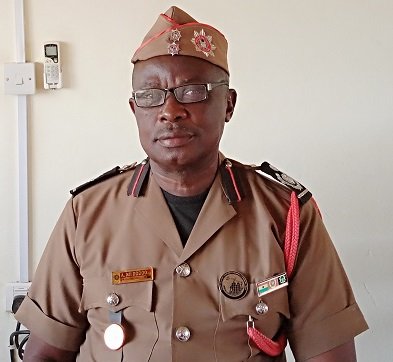Hot!
‘Firefighting is shared responsibility’

Since firefighting is a shard responsibility, the Ghana National Fire Service (GNFS) in the Upper West Region has called for the establishment of Bush Fire Prevention Committee at the district and regional levels respectively.
The command maintained that the Provisional National Defence Council (PNDC) Law 229 which established the GNFS made provision for the setting up of such committees to facilitate the prevention and combating of accidental fires at the district and regional levels effectively.
In an interview with The Spectator Newspaper at Wa on Tuesday, the Regional Commander, Assistant Chief Fire Officer (ACFO) Mr. Abraham Nii Dodoo said successful firefighting relied on joint efforts of the GNFS and other institutions.
“The Law 229 directs every District, Municipal or Metropolitan Assembly to form these committees with stakeholders from the assembly, the Ghana Water Company Limited (GWCL) or Community Water and Sanitation Agency (CWSA), Electricity Company of Ghana which in our case will be the Northern Electricity Distribution Company (NEDCo), a representative from the traditional council and two other appointed members, with the District Chief Executive as the Chairman of the committee”, he said.
He noted that a similar team was supposed to be replicated at the regional level where information about fire safety from the district level was brought to the fore for redress and said the collaboration among the aforementioned stakeholders was very paramount in firefighting.
“So for instance the GWCL or the CWSA is responsible for the provision of fire tenders at vantage points to enable the GNFS draw water when the need arises to fight fire hence a committee of that nature would ensure that we work together to identify key areas where the tenders will be needed as well as work on existing fire tenders with low pressure,” he explained.
He stated again that traditional authorities also had the responsibility of assisting the service to engage community members on the dangers of bush fires and their implication on the local economy.
“These committees when established will boost our collaboration with other stakeholders and ensure that we work collectively to prevent and fight accidental fires”, he said.
He stressed that most importantly the GNFS was inaugurating fire safety volunteers in the region who could depend on the support of the bush fire committees for the supply of some basic implements they needed for the work.
“These volunteers as their title suggests are not paid but a little motivation from the assemblies within which they are located will boost their ability to work harder for the district. We as a service can only provide them, with wellington boots and identification cards, among others but when it comes to fuel and other petty items such as whistles, the district assembly can dedicate a little of its common fund to support and make them more effective”, he said.
He appealed to the MMDAs in the region to prioritise the setting up of those committees in order to support firefighting agenda in the region.
From Lydia Darlington Fordjour, Wa
Hot!
Ghana to locally refine its gold starting October 2025 – Sammy Gyamfi

The Chief Executive Officer of the Ghana Gold Board, Sammy Gyamfi, has announced that plans are far advanced for the establishment of a state-owned gold refinery in the country.
Speaking at the 2025 Minerals and Mining Convention, Mr Gyamfi said the refinery will process locally mined gold into bullion instead of exporting it in its raw state.
According to him, it is unacceptable that Ghana, despite being a leading gold producer in Africa, continues to export raw gold known as dore.
He explained that the Gold Board, working with the Bank of Ghana and local refineries, will from October 2025 begin refining gold locally.
He also disclosed that an ultramodern assay laboratory will be built to ensure international standards in testing gold quality.
Mr Gyamfi noted that the refinery will be wholly state-owned and will help Ghana move away from raw mineral exports to value addition.
This, he said, will boost foreign exchange earnings, create jobs, and position Ghana as a hub for gold refining and jewellery production in Africa.
The CEO stressed that the project forms part of government’s strategy to ensure the country benefits fully from its natural resources and to transform the mining sector into a driver of economic growth.
By: Jacob Aggrey
Hot!
There is strength in diversity; let’s live in peace – Zanetor Rawlings urges Ghanaians

Member of Parliament for Korle Klottey, Dr. Zanetor Agyeman-Rawlings, has urged Ghanaians, especially the youth, to value the peace the country enjoys and to see diversity as a source of strength.
Speaking at the National Youth Conference held at the Pentecost Convention Centre under the theme “Igniting Potential; Inspiring Change”, she warned against being lured into conflicts and divisions fueled by reckless statements from politicians, traditional leaders, religious figures, or academics.
According to her, many young people have no idea what it means to live in a country torn apart by war, and therefore must not take Ghana’s peace for granted.
She stressed that the harmony among different ethnic and regional groups should be protected at all costs, since it is peace that allows citizens to gather freely and safely.
Dr. Zanetor said Ghana’s development depends on embracing diversity and working together.
She urged the youth to tap into this strength so that Ghana would continue to shine as the “Black Star” of Africa and serve as an example for other nations.
She expressed appreciation to the participants for attending the conference and asked for God’s blessings on the country.
By: Jacob Aggrey






